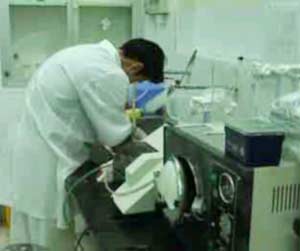Many studies on avian influenza vaccines
Pasteur Institute in Ho Chi Minh City, Nha Trang Pasteur Institute, Regional Veterinary Center (Ho Chi Minh City) have different research projects on influenza A / H5N1 vaccines for humans and poultry.
Pasteur Institute Ho Chi Minh City is conducting research on influenza A / H5N1 vaccine on humans from vetro cell line. This is the only cell line allowed by the World Health Organization to be used to prepare safe human vaccines.

H5N1 vaccine laboratory at the National Institute of Hygiene and Epidemiology (Photo: VNN)
Associate Prof. Dr. Nguyen Thi Kim Tien, Director of Ho Chi Minh City Pasteur Institute said on August 16, at the seminar "Strengthening surveillance and proactive prevention of avian influenza and influenza A / H5N1 in humans" .
According to Ho Chi Minh City Pasteur Institute, vero cells taken from green monkey kidneys have been applied in the world for 130 years, so it is very safe because there is no strange virus like other cell lines. However, the preparation of vaccines for humans is very difficult because avian influenza virus is difficult to cultivate on high-level animal cells.
Meanwhile, Nha Trang Pasteur Institute is also conducting research on human vaccines but with the method of raising viruses on chicken eggs with embryos.
In addition, the Regional Animal Health Center in Ho Chi Minh City also started the project " Research on epidemiology, pathogenesis and control of highly pathogenic avian influenza virus in ducks in Vietnam and Indonesia ". This project has the cooperation and support of two Australian units, the Center for Infectious Diseases Research and Cooperation - Queenland University and Veterinary Diagnostic Laboratory.
This project focuses mainly on small scale farmers in the Mekong Delta, to study the epidemiological characteristics of highly pathogenic H5N1 virus.
In addition, the project also focuses on the role of ducks as hosts for H5N1 virus during and after infection. The third goal of the project is to investigate the pathogenesis of avian influenza in ducks from H5N1 virus, and to evaluate the effectiveness of vaccines on ducks and to assess the role of vaccination in prevention of virus infection and waste.
This project will last from 8/2006 to 8/2009.
H.Cat
- Vietnam produces vaccines to prevent new strains of influenza A / H5N1
- New prospects against avian influenza pandemic
- Vietnam successfully studied influenza A / H5N1 vaccine and influenza A / H1N1
- The risk of a H7N9 outbreak in winter in China
- Hong Kong prepares breakthrough vaccines against influenza H7N9
- The emergence of new avian influenza virus is potentially lethal
- Things to know to avoid influenza A / H7N9
- H7N9 influenza virus is more dangerous
- H5N1 avian influenza virus
- Avian influenza virus has changed
- Vaccination against influenza H7N9 initially tested successfully
- Avian influenza has grown rapidly on a large scale
 March 2012: Launching H5N1 vaccine for poultry
March 2012: Launching H5N1 vaccine for poultry Experts comment on the mysterious gradual disappearance of the Delta variant in Japan
Experts comment on the mysterious gradual disappearance of the Delta variant in Japan Danger of the two Delta . branch variants
Danger of the two Delta . branch variants 2020 pandemic flu attack humans?
2020 pandemic flu attack humans?